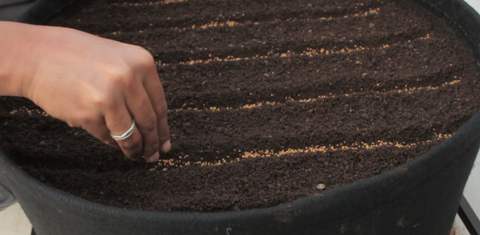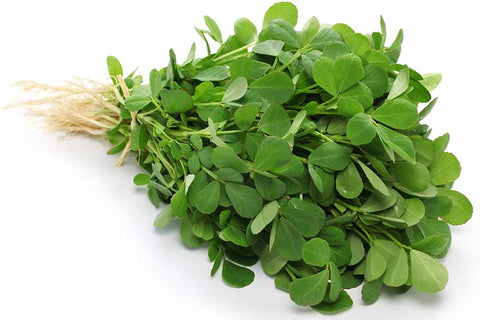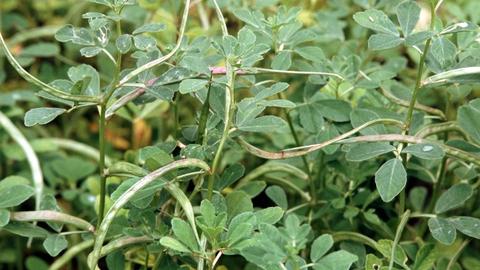How to Grow
How to Grow Methi (Fenugreek) from Seeds at Home Easily
Fenugreek a green leafy leguminous plant is also called Methi/ Menthya in different parts of India.
Being a leafy vegetable, it has a bunch of health benefits.
Besides having many health benefits, it is very easy to grow in your kitchen garden, indoor pots, and even in a bowl of water.
Here is a piece of step-wise brief information about how to grow fenugreek plants in your kitchen garden/ terrace garden.

Centre of origin: South-Eastern Europe/ Europe
10 Easy Steps to Grow Fenugreek (Methi) for Your Garden
1. Soil
Select well-draining, fertile, and less compact soil or potting mix to grow methi. The soil pH should be neutral for the healthy growth of the plants.

2. Location
3. Seeds

4. Water
Water in the morning and evening consistently. Do not let the soil dry between watering when seeds need to be germinated.

5. How to care
When you have sown seeds, care should be taken in terms of watering them until they germinate. We have to water them twice a day until they germinate and establish well.
6. Pests
Methi greens are usually attacked by leaf miners, aphids, and sometimes with thrips and cutworms.
7. Diseases
Rarely Methi greens are attacked by powdery mildew, Cercospora leaf spot, and damping off.
8. How to control pests and diseases
Use horticultural soap or neem oil solution once a week as a prophylactic spray for plants, to control the occurrence of pests and diseases.
9. Harvesting of leaves
Methi leaves can be harvested from 21days onwards seed sowing. You can go for pinching the tip of leaves if you are interested to regrow more methi leaves. Or cut the stems along with leaves according to your preference

10. Harvesting of seeds
when you have grown Menthya plants for their seeds, you need to wait more days until the plant produces pods. Wait until the pods turn yellow and dries. Then collect the seeds from pods and dry them one day under direct sunlight. Store it in an airtight container.

Health benefits of Methi
1. Consumption of methi may reduce the blood sugar level
2. Fenugreek helps in the digestion
3. Consumption of methi/ fenugreek enhances milk production in lactating mothers
4. May control bad cholesterol levels.
5. Methi reduces menstrual cramps
Click here to know how to grow lettuce from seeds.
Click here to know how to grow coriander from seeds.
FAQs on Growing Methi at Home
1. How long does Methi take to grow?
Fenugreek or Methi usually takes very little time. You can start harvesting methi leaves from 20 days itself. If you are thinking to harvest seeds you have to wait for more days to get dried and matured fenugreek seeds.
2. How do you germinate Methi seeds?
There are different ways to germinate methi seeds. First, you can soak them in water for 4-5 hours after that, you can keep seeds in an airtight container for getting germination. Second, you can place the soaked seeds on a wet cloth and tie it airtightly to get germination within a day. The last way is you can sow seeds directly in the soil to get germination.
3. What is the best time to grow Methi seeds?
Methi can be grown all around the year in Indian climatic conditions.
4. Can we grow Methi at home?
It is the easiest leafy vegetable that can grow at home compared to other vegetables. you require seeds, potting mix/ fertile soil, and water for starting/growing methi plants.
5. How to harvest methi?
When plants reach physiological maturity start harvesting leaves with a pair of scissors. Cut the tip of plants to enjoy the best taste of the plant. If you have secateurs, you can use them cutting stems and leaves of the methi plant.
6. When fenugreek plants become ready for harvesting?
Fenugreek greens are the fastest-growing plants among the leafy vegetables. You can start cutting plants from the third week onwards. Do not wait for too many days the leaves may turn bitter due to the production of flowers. harvest early and enjoy the tender plants.
7. Can we store methi leaves for more number days after harvesting?
Yes, you can store the leaves for days in airtight zipper bags or any other container. But it is always better to eat the leafy greens on the day of harvesting for the best taste and texture.




